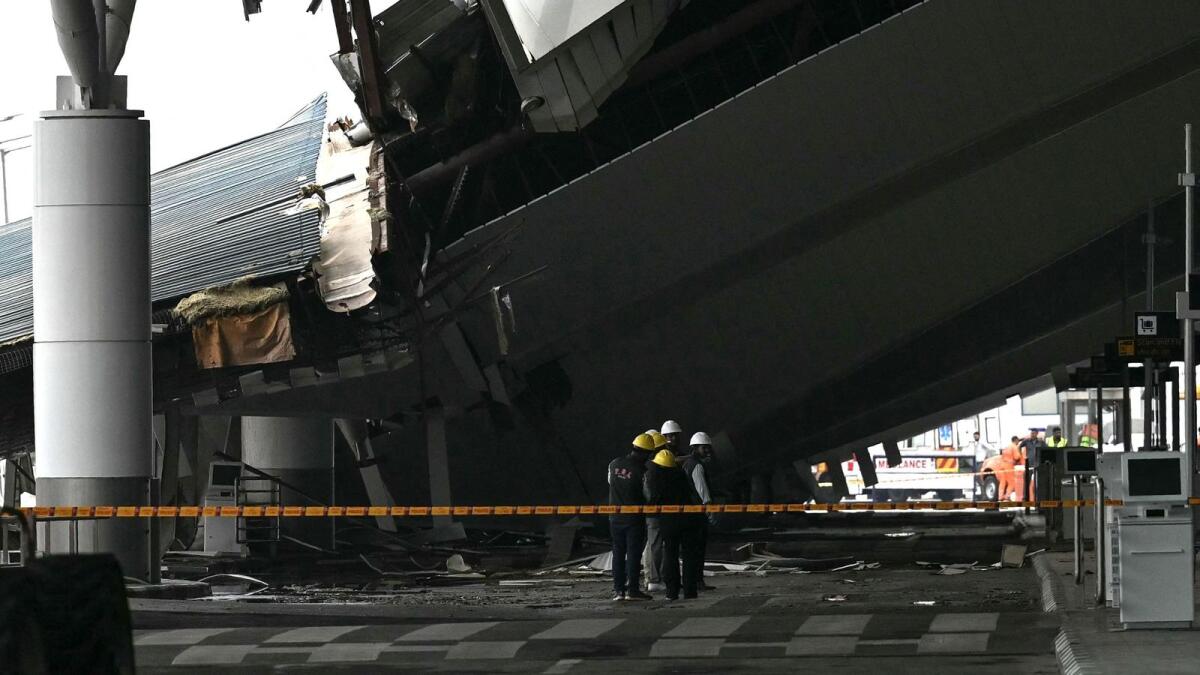An incident occurred at New Delhi’s Indira Gandhi International Airport on June 28, where a portion of the canopy at Terminal 1 collapsed due to heavy rains. This led to the closure of the terminal, impacting flights and causing one fatality and several injuries. UAE airlines, including Flydubai and Emirates, confirmed that their operations were not affected by the incident. Flydubai flights to and from Delhi continued as scheduled, while Emirates does not operate from Terminal 1.
Additionally, Etihad Airways, based in Abu Dhabi, stated that their flights were not affected by the closure of Terminal 1. However, they anticipated congestion at the airport due to the adverse weather and the shift of flights from the affected terminal to Terminal 3. Passengers were advised to arrive early, check-in online when possible, and prioritize safety on their way to the airport. Flights from Terminal 1, including those bound for the UAE by IndiGo and SpiceJet, were cancelled as a result of the incident.
The tragedy at Delhi Airport highlights the potential risks posed by extreme weather conditions and the need for safety measures to prevent such incidents in the future. Authorities at the airport are likely to conduct investigations into the cause of the collapse and implement necessary measures to enhance the structural integrity of the terminal buildings. Passengers traveling through the airport are urged to stay updated on any developments and follow safety guidelines provided by the airlines.
Despite the closure of Terminal 1, flights from UAE airlines operated smoothly, with no reported disruptions. This demonstrates the resilience and efficiency of these airlines in responding to unexpected situations and ensuring minimal impact on their operations. Passengers traveling to and from Delhi with UAE airlines can have confidence in the airlines’ ability to manage challenging circumstances and prioritize safety above all else.
The incident serves as a reminder of the importance of adhering to safety protocols and regulations in the aviation industry. Airlines and airport authorities must prioritize the safety and well-being of passengers and staff by conducting regular maintenance checks, implementing safety procedures, and responding promptly to any potential threats or risks. By promoting a culture of safety and vigilance, the aviation industry can mitigate the impact of unforeseen events and ensure a secure travel environment for all.
As the aviation industry continues to evolve and expand, it is essential for stakeholders to remain proactive in addressing safety concerns and implementing best practices to prevent accidents and incidents. Collaborative efforts between airlines, airport authorities, and regulatory bodies are crucial in maintaining high safety standards and protecting the integrity of air travel. By learning from past events and implementing lessons learned, the industry can continuously improve its safety measures and enhance the overall travel experience for passengers worldwide.
In conclusion, the incident at Delhi Airport serves as a sobering reminder of the potential risks associated with extreme weather conditions and the importance of prioritizing safety in the aviation industry. While the incident led to disruptions and cancellations at Terminal 1, UAE airlines managed to maintain their operations seamlessly. Moving forward, it is crucial for all stakeholders to work together to ensure the highest standards of safety and security in air travel, thereby safeguarding the well-being of passengers and crew members. By remaining vigilant and proactive in addressing safety concerns, the aviation industry can enhance its resilience and readiness to respond to any challenges that may arise.











